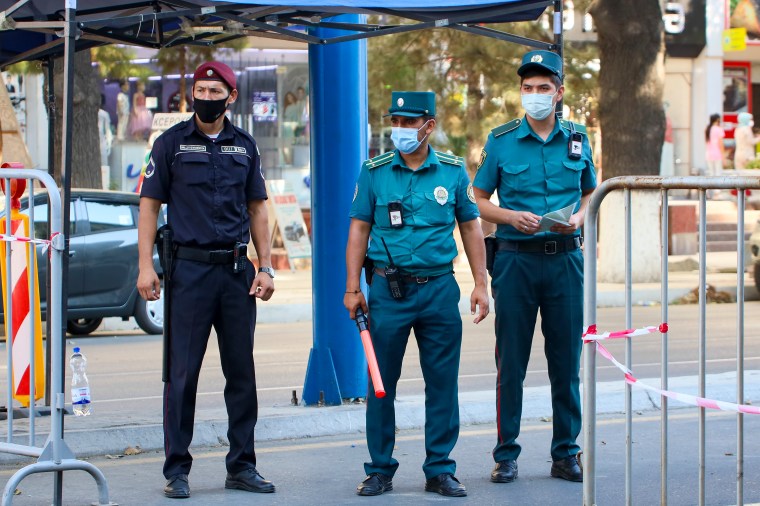Since July 25, 2020, Uzbek police and representatives of the country’s public prosecutor’s office have interrogated at least six local journalists and confiscated their computers and mobile devices, according to news reports and journalists who spoke to CPJ.
On July 25, several local Uzbek outlets shared allegations originally published on the news website Repost that Musa Yerniyazov, chair of the Supreme Council of the Uzbek Republic of Karakalpakstan, had died from COVID-19, according to news reports.
Later that day, Repost posted an apology, saying that Yerniyazov had not died, and alleging that hackers had secretly published the article on July 20 – the article’s dateline – without the knowledge of Repost’s editors, or published it later but with that dateline.
The press office of Uzbekistan’s Ministry of Health also issued a statement denying Yerniyazov’s death. According to a July 30 report by local independent outlet Gazeta.uz, Yerniyazov was diagnosed with COVID-19 and is in serious condition.
On the night of July 25, officers detained Lolagul Kalykhanova, chief editor of independent news website Makan, which had shared the allegations before they were denied, at her home in the western city of Nukus, according to news reports and Kalykhanova, who spoke to CPJ on the phone.
The officers confiscated her mobile phone, made Kalykhanova reveal her password to it, and took her to the local prosecutor’s office, where they interrogated her about the allegations of Yerniyazov’s death, she said.
Kalykhanova said she had shared Repost’s allegations on Makan’s Telegram channel earlier that day, and also posted the refutation as soon as she saw it.
Also that night, law enforcement officers detained Iskandar Yusupov, chief editor of independent news website Kruz, and Kumar Begniyazova, chief editor of independent news website Kar24, at their respective homes in Nukus, and took them to the same prosecutor’s office, according to news reports.
Officers confiscated Yusupov’s laptop and cell phone, he told CPJ via messaging app. The officers inspected Begniyazova’s phone in her presence but did not confiscate it, according to a report by Gazeta.uz.
Yusupov had reposted the story about Yerniyazov’s death on Kruz earlier that day, but Kar24 only published the refutation, according to Yusupov and that report.
The journalists were each released later that night without charge, according to Gazeta.uz.
The local prosecutor’s office issued a statement on July 27 saying the three journalists had been detained because they had spread “fabricated information,” and said the interrogations were conducted as “preventive” measure.
On July 26, authorities summoned blogger Shukhrat Saidahmadov, who runs the Saidahmadov blogi Telegram news channel, which has over 2,000 subscribers, and Berdakh Nauryzbayev, administrator of the local Telegram news channel Karakalpak 24, with over 59,000 subscribers, to the Department of Internal Affairs in Nukus, according to news reports.
Police interrogated the bloggers about their posts concerning Yerniyazov’s alleged death, and confiscated their electronic devices, according to those reports.
Saidahmadov told Gazeta.uz that he did not repost the allegations about Yerniyazov’s death, but only published refutation of the news.
CPJ could not immediately reach the bloggers or confirm if the Department of Internal Affairs returned their devices. According to those news reports, they were released without charge.
On July 27, officers also summoned Sultanbek Ziyaev, a blogger at the Ziyaev blogi news channel, which has over 2,000 subscribers, to the same Department of Internal Affairs in Nukus for questioning, and released him without charge, according to those reports.
In an interview on July 28, Deputy Prosecutor General Svetlana Artykova criticized the actions of Nukus law enforcement in relation to journalists, and said that the prosecutor general’s office started an inquiry into the actions of the employees of the Nukus prosecutor’s office.
CPJ emailed the prosecutor general’s office for comment, but did not receive any response.
The prosecutor’s office returned Kalykhanova’s phone on July 29, she told CPJ. She said she believed the phone had been tampered with and potentially hacked, saying, “I cannot use this phone now, I do not know what they did with it. I had to purchase a new phone.”
Authorities also returned Yusupov’s laptop and phone on July 29; he said his phone had been stored in a sealed envelope and seemed untouched, but the computer was not stored securely and may have been compromised.
